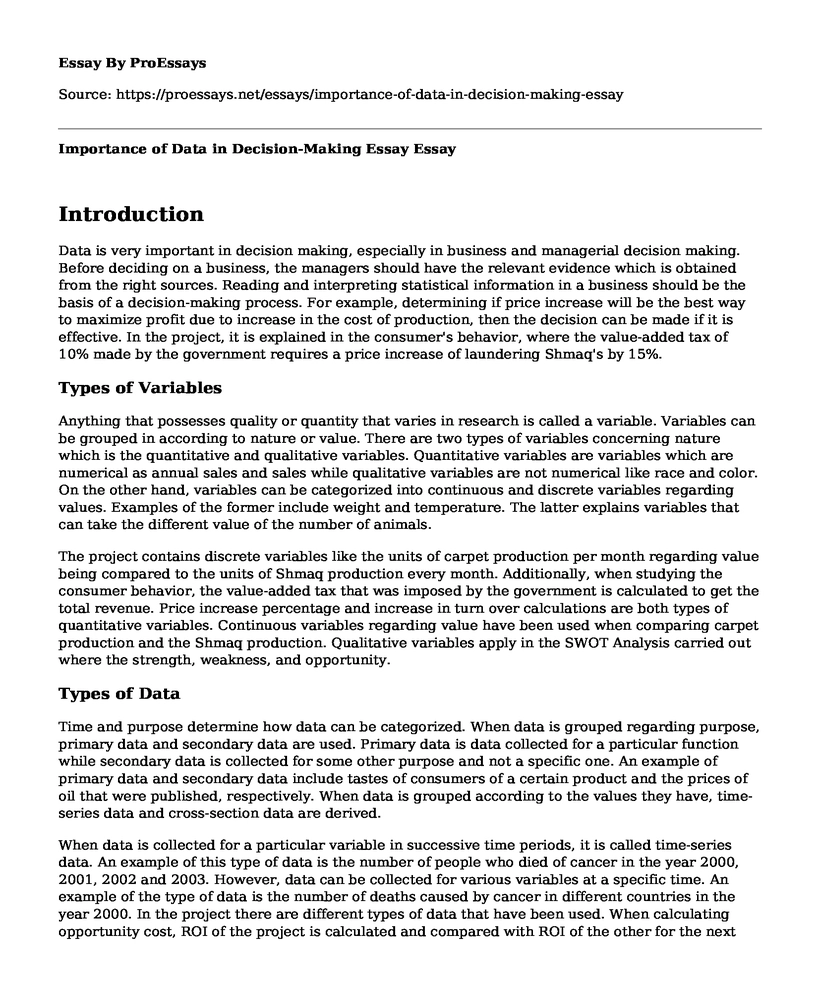Introduction
Data is very important in decision making, especially in business and managerial decision making. Before deciding on a business, the managers should have the relevant evidence which is obtained from the right sources. Reading and interpreting statistical information in a business should be the basis of a decision-making process. For example, determining if price increase will be the best way to maximize profit due to increase in the cost of production, then the decision can be made if it is effective. In the project, it is explained in the consumer's behavior, where the value-added tax of 10% made by the government requires a price increase of laundering Shmaq's by 15%.
Types of Variables
Anything that possesses quality or quantity that varies in research is called a variable. Variables can be grouped in according to nature or value. There are two types of variables concerning nature which is the quantitative and qualitative variables. Quantitative variables are variables which are numerical as annual sales and sales while qualitative variables are not numerical like race and color. On the other hand, variables can be categorized into continuous and discrete variables regarding values. Examples of the former include weight and temperature. The latter explains variables that can take the different value of the number of animals.
The project contains discrete variables like the units of carpet production per month regarding value being compared to the units of Shmaq production every month. Additionally, when studying the consumer behavior, the value-added tax that was imposed by the government is calculated to get the total revenue. Price increase percentage and increase in turn over calculations are both types of quantitative variables. Continuous variables regarding value have been used when comparing carpet production and the Shmaq production. Qualitative variables apply in the SWOT Analysis carried out where the strength, weakness, and opportunity.
Types of Data
Time and purpose determine how data can be categorized. When data is grouped regarding purpose, primary data and secondary data are used. Primary data is data collected for a particular function while secondary data is collected for some other purpose and not a specific one. An example of primary data and secondary data include tastes of consumers of a certain product and the prices of oil that were published, respectively. When data is grouped according to the values they have, time-series data and cross-section data are derived.
When data is collected for a particular variable in successive time periods, it is called time-series data. An example of this type of data is the number of people who died of cancer in the year 2000, 2001, 2002 and 2003. However, data can be collected for various variables at a specific time. An example of the type of data is the number of deaths caused by cancer in different countries in the year 2000. In the project there are different types of data that have been used. When calculating opportunity cost, ROI of the project is calculated and compared with ROI of the other for the next five years. The types of data applied here are time-series data. Also, it can be considered as a primary data since it is collected to get the opportunity cost of the project.
Methods of Data Collection
There are three methods of data collection that are used in research which include Interviews, self-completion questionnaires, and personal observation. In interviews, an interviewer asks the interviewee to get the required information from them. These interviews can be carried out on the telephone or skype or even face to face. There are three types of interviews which include structured, semi-structured interviews and unstructured. In the structured interview, the interviewer uses a questionnaire where he or she reads the questions and fills the questionnaire when the interviewee has answered them. When a semi-structured interview is used, the set of clear and prepared questions are given to the interviewee to answer them. Unstructured has no defined question, only the topic that is given to the interviewee.
Large data and high rate of response can be obtained through interviews which are flexible. A self-completion questionnaire is a questionnaire completed by the interviewee with no direct help. Another type of data collection is the personal observation where data is observed and collected directly, for example, color preference in children. The only type of data collection used in the project is the personal observation, where units of production and opportunity costs were calculated.
Cite this page
Importance of Data in Decision-Making Essay. (2022, Apr 04). Retrieved from https://proessays.net/essays/importance-of-data-in-decision-making-essay
If you are the original author of this essay and no longer wish to have it published on the ProEssays website, please click below to request its removal:
- Paper Example on Enterprise Risk Management
- Personal Leadership Training Plans: Knowledge
- Essay Sample on Transformative Leadership Style
- The Future of Nursing: Leading Change, Advancing Health Essay
- Essay Sample on The Essential Qualities of Effective Leadership: Communication, Integrity & More
- Essay on Overcoming Resistance to Change: An Example From Kegan and Lahey (2001)
- Essay Example on Be the Best: My Aspiration as House Captain of XXXX House







